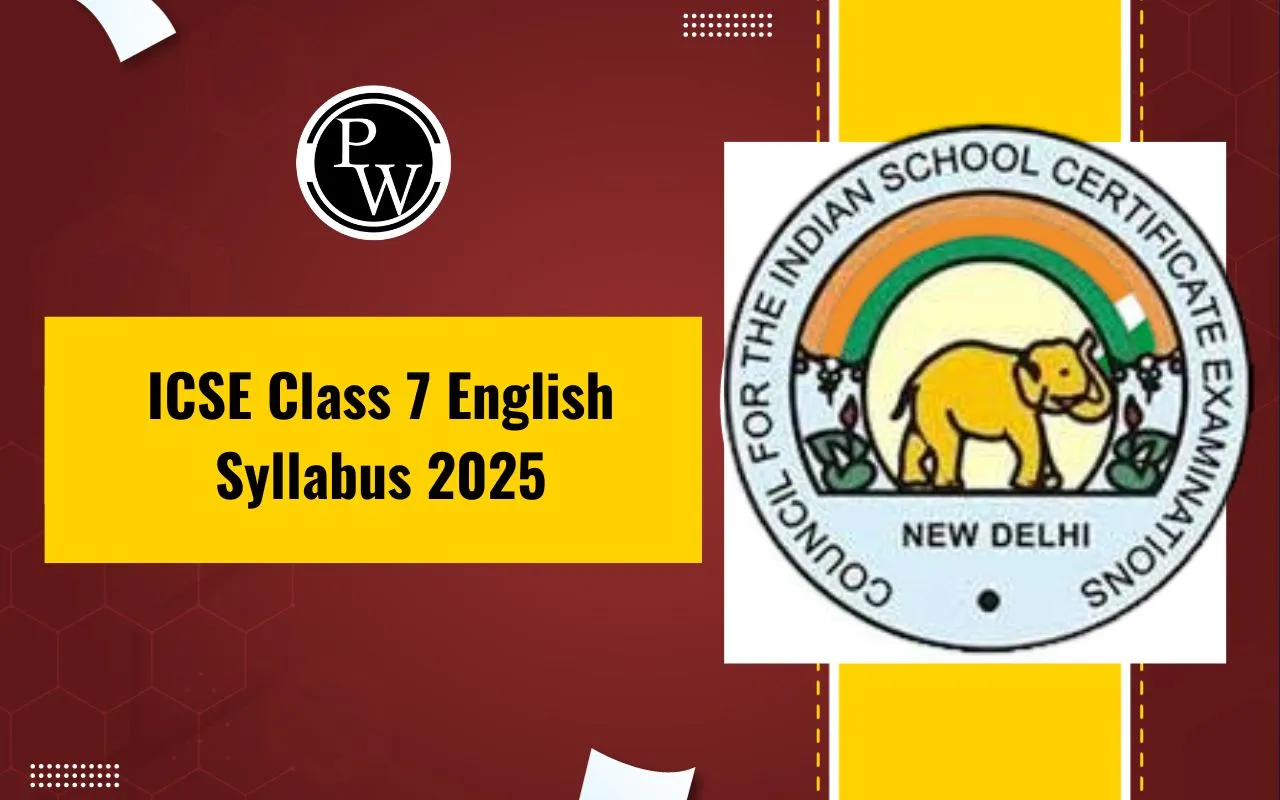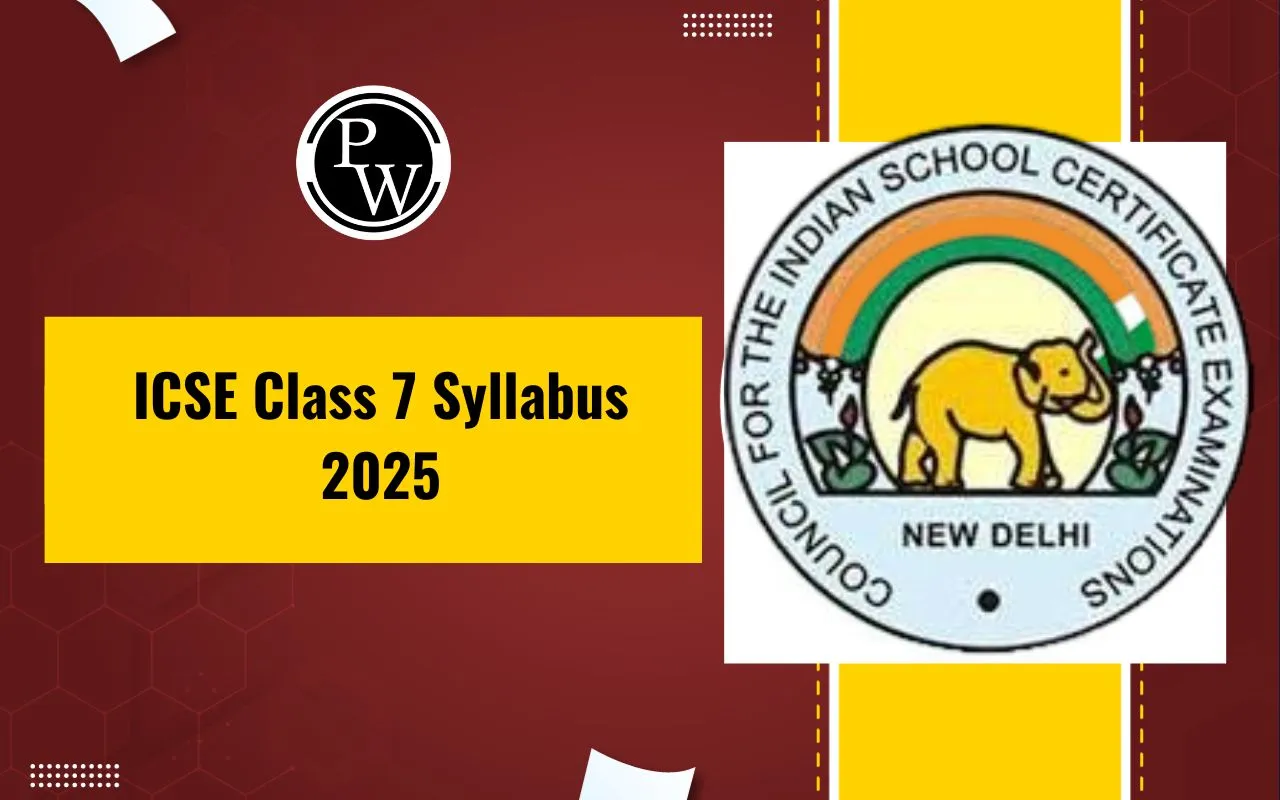
ICSE Class 7 English syllabus for the academic year 2025–26 is designed to help students strengthen their command over the English language. It covers key areas such as grammar, composition, comprehension, and vocabulary, with a focus on improving both written and spoken communication.
Students learn to express their ideas clearly, understand various sentence forms, and apply grammar rules confidently. The curriculum also helps improve reading skills through comprehension passages and builds writing ability through tasks like letter writing, story writing, and descriptive paragraphs.
ICSE Class 7 English Syllabus 2025–26
The ICSE Class 7 English syllabus focuses on strengthening students’ skills in grammar, vocabulary, comprehension, and composition. It introduces more advanced topics compared to Class 6 and encourages students to write clearly, read with understanding, and apply grammar rules effectively. Each topic in the syllabus is aimed at helping students communicate more confidently and prepare for higher academic levels.
Mastering grammar concepts, improving vocabulary, and practicing reading and writing regularly will help students perform well in the subject. Below is the complete chapter-wise syllabus for Class 7 English:
|
ICSE Class 7 English Syllabus 2025–26 |
|
|
Topic No. |
Topic Name |
|
1 |
Nouns |
|
2 |
Pronouns |
|
3 |
Articles |
|
4 |
Adjectives |
|
5 |
Verbs |
|
6 |
Adverbs |
|
7 |
Verbs: Future Tense |
|
8 |
Verbs: Past Tense |
|
9 |
Verbs: Future Tense (duplicate) |
|
10 |
Verbs: Perfect Tense |
|
11 |
Finite and Non-Finite Verbs |
|
12 |
Modals |
|
13 |
Active and Passive Voice |
|
14 |
Prepositions |
|
15 |
Conjunctions |
|
16 |
The Sentence |
|
17 |
Phrases and Clause |
|
18 |
Sentence Types |
|
19 |
Direct and Indirect Speech |
|
20 |
Punctuations |
|
21 |
Phrasal Verbs and Idioms |
|
22 |
Vocabulary |
|
23 |
Comprehension |
|
24 |
Composition |
Detailed Overview of ICSE Class 7 English Syllabus
Here is a detailed overview of the ICSE Class 7 English syllabus, with each chapter:
Grammar and Language Structure
-
Nouns – Types (common, proper, collective, abstract), singular/plural, and gender
-
Pronouns – Personal, demonstrative, interrogative, possessive, and relative pronouns
-
Articles – Usage of definite and indefinite articles (a, an, the)
-
Adjectives – Degrees of comparison, types (descriptive, quantitative, demonstrative), and correct usage
-
Verbs – Main verbs, helping verbs, transitive/intransitive
-
Adverbs – Types (manner, place, time, frequency, degree) and placement
-
Verbs: Future Tense – Simple future, future continuous
-
Verbs: Past Tense – Simple past, past continuous, past perfect
-
(Duplicate: Verbs: Future Tense – May be merged with topic 7)
-
Verbs: Perfect Tense – Present perfect, past perfect, and future perfect
-
Finite and Non-Finite Verbs – Gerunds, infinitives, participles
-
Modals – Can, could, shall, should, may, might, must, etc.
-
Active and Passive Voice – Changing voice in all tenses, identifying voice
-
Prepositions – Types and correct usage in sentences
-
Conjunctions – Coordinating, subordinating, and correlative
-
The Sentence – Parts of a sentence, sentence structure
-
Phrases and Clauses – Types and usage in complex sentences
-
Sentence Types – Declarative, interrogative, imperative, exclamatory
-
Direct and Indirect Speech – Changing speech in present and past tenses
-
Punctuations – Commas, full stops, quotation marks, apostrophes, colons, etc.
-
Phrasal Verbs and Idioms – Common expressions and their meanings
Vocabulary and Comprehension
-
Vocabulary – Synonyms, antonyms, homonyms, word meanings, spellings, and usage
-
Comprehension – Reading unseen passages and answering questions based on them
-
Focus on inferential and factual understanding
-
Develops reading speed and interpretation skills
Composition (Creative and Functional Writing)
-
Composition – Writing different types of content such as:
-
Essays (descriptive, narrative, imaginative)
-
Letters (formal and informal)
-
Story writing
-
Diary entries
-
Notices and email writing (as per school’s curriculum additions)
ICSE Class 7 English Syllabus 2025–26 PDF Download
ICSE Class 7 English syllabus for the academic year 2025–26 is designed to enhance students' grammar, vocabulary, comprehension, and writing skills. It supports learners in building confidence in both written and spoken English while strengthening their understanding of sentence structure, punctuation, and creative expression.
For easy reference and better planning, the complete ICSE Class 7 English syllabus is available in PDF format. Students can use the syllabus throughout the year to track their progress, revise key topics, and stay prepared for exams.
ICSE Class 7 English Syllabus 2025
Study without using the internet
Benefits of Using the ICSE Class 7 English Syllabus
- The syllabus includes a full set of grammar lessons, writing tasks, and reading comprehension topics that guide learning throughout the academic year.
- Knowing what topics to study helps students manage their time better and avoid last-minute stress before exams.
- Since the syllabus follows ICSE guidelines, it ensures that students stay in sync with what is being taught in class.
- Regular writing practice based on the syllabus improves expression, organization of ideas, and correct usage of grammar.
- Reading comprehension tasks encourage students to read actively and understand what they read, improving focus and interpretation.
- Students can use the syllabus as a checklist while revising or preparing for assessments at school.
- With focus on grammar topics like tenses, modals, and voice, the syllabus helps students write and speak with greater correctness.
ICSE Class 7 English Syllabus 2025 FAQs
Who prepares the ICSE Class 7 English syllabus?
What are the main topics covered in Class 7 English?
Is the ICSE Class 7 English syllabus the same for all schools?
How is the Class 7 English exam structured?



